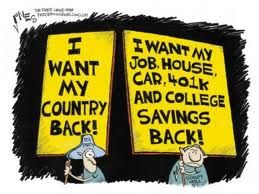Cross-posted to CandyBullets, MyLeftWing, firefly-dreaming and Docudharma
If you follow my website (CandyBullets) you’re probably well aware of the threat posed by the “IP PROTECT ACT” known more commonly as the Internet Blacklist bill. You’re may also be aware that this bill was recently halted in the Senate by the true Democrat Senator Ron Wyden (D-OR) who prevented the bill from coming up for a vote in the Senate (where it would doubtless pass) however a House version will be introduced this week with help of Representative Bob Goodlatte (R-VA) — probably tomorrow. If you’re not familiar with this bill then I suggest you become acquainted (the full text of the bill may be found here.)
It was once said about the much over analyzed movie Last Tango In Paris that it was a simple movie at heart: a movie about real estate, two people who want an apartment and will do anything to get it. In a similar vane Protect IP is also simple: it is merely the latest in a long line of slovenly hand-outs to corporations at the expense of your civil rights; it would give the Government broad, censorious new powers to shut down any site merely accused of Copyright Infringement and fuck the concept of innocent until proven guilty, yes, the PROTECT IP ACT authorizes an alleged “rights holder” who decides to claim to be the victim of the “infringement” to bring an action against the owner, registrant, or Internet site “dedicated to infringement”, whether domestic or foreign, and seek a court order against the domain name registrant, owner, or the domain name. The DOJ version however can apply against ISPs, search engines, ad providers and payment processors.
Of course corporate America, what were the founding fathers thinking? Of course you must be given permission to shut down YouTube and Facebook so that no one can potentially infringe upon your Copyrights. I recall Franklin making a remark about trading liberty for safety. This bill would criminalize YouTube, Twitter, Facebook, Myspace, Google+, Reddit, Digg, not least this site you’re reading this at. Any other site that uses user generated content. But you know, I’m glad to know that when conservative Orrin Hatch (R-UT) and nominal liberal Patrick Leahy’s (D-VT) delightfully bipartisan fascism was first shot down when they coauthored COICA (The Combating Online Infringement and Counterfeits Act) these two adorable little corporate shills decided to take our criticisms into account. This time they remembered to ban criticism. Their new “PROTECT IP ACT” retains the blacklist of websites our “Democratic” Govenrment doesn’t wanting us looking at but ads a new one that we’ll just have to take a moment to marvel at: It bans people from even being able to discuss blacklisted sites. Under the new bill, anyone “referring or linking” to a blacklisted site will be Blacklisted themselves.
Yes this “bunker-buster bluster bomb” (h/t Ron Wyden) far past simply requiring these other service providers from blocking service, this new law will require search engines to censor sites out of their index. Now please understand, “infringing websites” is in no way defined in a reasonable way — the bill is not being specific about what constitutes an infringing web sites. For example if WikiLeaks or any similar organization were merely accused of distributing copyrighted content, U.S. search engines could be served a court order to BLOCK search results pointing to Wikileaks. Requiring search engines to remove links to an entire website altogether due to an infringing page raises alarming free speech concerns regarding lawful content hosted elsewhere on the site. The fact that an injunction can be issued without notifying the allegedly, supposedly infringing website essentially destroys the entire legal “presumption of innocence”, there is no innocent until proven guilty with this bill.


 Despite the anger that the American public felt towards the United Kingdom after the British Parliament established the Coercive Acts, called the
Despite the anger that the American public felt towards the United Kingdom after the British Parliament established the Coercive Acts, called the
Recent Comments